.jpg)
The Open Government Partnership is a multilateral initiative that aims to secure concrete commitments from governments to promote transparency, empower citizens, fight corruption, and harness new technologies to strengthen governance.
For more information please
visit the site
.jpg)
UNODC is a global leader in the fight against illicit drugs and international crime. Established in 1997 through a merger between the United Nations Drug Control Programme and the Centre for International Crime Prevention, UNODC operates in all regions of the world through an extensive network of field offices. UNODC mainly provides:
- Field-based technical cooperation projects to enhance the capacity of Member States to counteract illicit drugs, crime and terrorism
- Research and analytical work to increase knowledge and understanding of drugs and crime issues and expand the evidence base for policy and operational decisions
- Normative work to assist States in the ratification and implementation of the relevant international treaties, the development of domestic legislation on drugs, crime and terrorism, and the provision of secretariat and substantive services to the treaty-based and governing bodies.
For more information please
visit the site
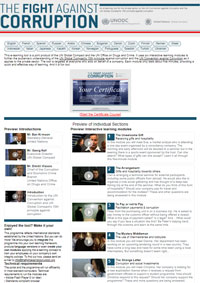
This e-learning tool is a joint product of the UN Global Compact and the UN Office on Drugs and Crime. The tool uses six interactive learning modules to further the audience’s understanding of the UN Global Compact’s 10th principle against corruption and the UN Convention against Corruption as it applies to the private sector. The tool is targeted at everyone who acts on behalf of a company. Each module only lasts about five minutes, providing a quick and effective way of learning.
For more information please
visit the site
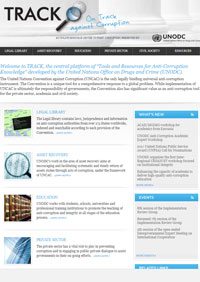
This is a web-based anti-corruption portal developed by the UNODC. This tool includes a legal library, online courses, a search engine specialised in anti-corruption literature, and other resources. The Legal Library on the United Nations Convention against Corruption (UNCAC) provides a gateway to an electronic database of legislation and jurisprudence relevant to UNCAC from over 175 States systematized in accordance with the requirements of the Convention. The TRACK portal brings together legal and non-legal knowledge on anti-corruption and asset recovery enabling Member States, the anti-corruption community and the general public to access this information in a central location. An anti-corruption learning platform is also incorporated, providing a common space where analytical tools generated by partner organizations can be searched and accessed by users world-wide.
For more information please
visit the site
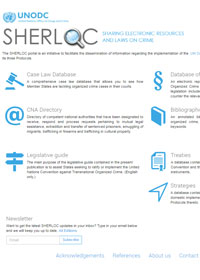
The SHERLOC knowledge management portal is a tool designed to facilitate the dissemination of information regarding the implementation of the UN Convention against Transnational Organised Crime and its protocols. In this portal, national examples of anti-corruption laws can be found, as well as tools for enhancing international cooperation in the fight against corruption and organised crime, along with other useful resources. The portal hosts a case law database, a database of legislation, a bibliographic database, and a directory of national competent authorities. The case law database contains jurisprudence on corruption, counterfeiting, cybercrime, drug offences, money laundering, obstruction of justice, participation in an organized criminal group, piracy, smuggling of migrants, trafficking in firearms, trafficking in cultural property, wildlife and forest crime, trafficking in persons and other crimes. The database of legislation is an electronic repository of laws relevant to the provisions of the United Nations Convention against Transnational Organized Crime (UNTOC). The bibliographic database is an annotated bibliography containing a synopsis of key articles that are searchable by countries, research methods and keywords. The directory contains the contact information of competent national authorities authorized to receive, respond to and process requests of assistance for matters related to organised crime.
For more information please
visit the site
.jpg)
The Stolen Asset Recovery Initiative (StAR) is a partnership between the World Bank Group and the United Nations Office on Drugs and Crime that supports international efforts to end safe havens for corrupt funds. StAR works with developing countries and financial centres to prevent the laundering of the proceeds of corruption and to facilitate a more systematic and timely return of stolen assets.
StAR works with and helps bring together governments, regulatory authorities, donor agencies, financial institutions, and civil society organizations, fostering collective responsibility and action for deterrence, detection and recovery of stolen assets.
For more information please
visit the site
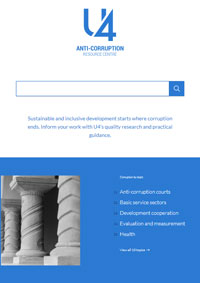
U4 offers relevant anti-corruption material, including applied research (featured under Themes), through an extensive web-based resource centre. U4 also runs in-country workshops and online courses on anti-corruption measures and strategies for partner agencies and their counterparts.
For more information please
visit the site
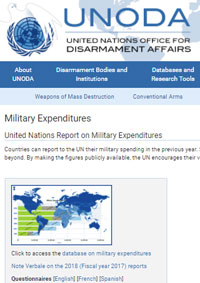
The purpose of the UN Standardized Reporting Instrument for Military Expenditures is to contribute to a broad effort to develop a set of specific measures for the purpose of facilitating the reduction of military expenditures. This tool also enhances transparency in military matters which is an essential element for building a climate of trust and confidence between States worldwide. The UN Standardized Reporting Instrument for Military Expenditures has also played an important role in acting as a model for similar reporting instruments, such as the one used by the Organization for Security and Cooperation in Europe (OSCE).
For more information please
visit the site
![]()
Canadian PPP Project Database is a tool developed by the Canadian Council for Public-Private Partnerships. This tool allows keeping track of current and past projects, their progress and status. Projects are organised by sector and geographical area. The database is an overview of the projects undertaken by Canada within the framework of public-private partnerships and contributes to transparency and facilitates public oversight.
For more information please
visit the site
![]() For more information please
For more information please
visit the site
Page 5 of 7



